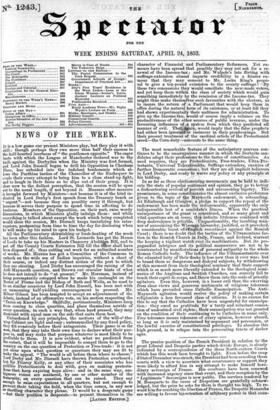NEWS OF THE WEEK.
IT is a low game our present Ministers play, but they play it with skill ; though perhaps they owe more than half their success to the half-hearted inertness of " the gentlemen opposite." The eager haste with which the League at Manchester declared war to the knife against the Derbyites when the Ministry was first formed, and Lord Iohn Russell began to drill his Opposition in Chesham Place, has subsided into the indolent bonhommie which al- lows the Parthian tactics of the Chancellor of the Exchequer to evade their every attempt to bring him to a close stand-up fight, and to laugh in their faces as he slips out of their grasp. It is clear now to the dullest perception, that the session will be spun at to the usual length, if not beyond it. Measure after measure is brought forward by Ministers—not because it is of the kind in- dicated in Lord Derby's first speech from the Treasury bench as a urgent "—not because they can possibly carry it through, but because it serves their purpose to spend time in affecting to do business. Members of the Opposition, on their part, raise wordy discussions, in which Ministers gladly indulge them: and while everything is talked about except the work which being completed would close the session, Mr. Disraeli keeps tantalizing his inter- rogators, postponing from time to time the day for disclosing when he will make up his mind to open his budget.
All the Parliamentary skirmishing or'bush-beating of the week has been after this fashion. Lord St. Leonards has got the House of Lords to take up his Masters in Chancery Abell Bill, and to put off the County Courts Extension Bill till the er shall have been disposed of; thus cutting'out work for an unlimited number of weeks. Mr. Herries has got a Committee of the Commons to embark on the wide sea of Indian inquiries, without a chart of their course, or indeed any distinct notion of the port to which they are steering. Lord Derby has encouraged the raising of the Anti-Maynooth question, and thrown out oracular hints of what he does not intend to do " at present." Mr: Horsman, instead of being peremptorily estopped when he made his onslaught on the Rector of Frome and the Bishop of Bath and Wells, as he used to be on similar occasions by Lord John Russell, has Leen met with an unmeaning - half-yielding encouragement to proceed. Mr. Milner Gibson has been tempted to accept an adjournment of the debate, instead of an affirmative vote, on his motion respecting the "Taxes on Knowledge." Skilfully, pertinaciously, Ministers keep from coming to close quarters, and place themselves astride of every question, in such a way that when hard pressed, they may dineount with equal ease on the side that suits them best.
Unburdened by any principles, the motions of the will-o'-the- Wisp Cabinet are light and easy; untrammelled by any fixed policy, they flit evasively before their antagonists. Their game is so far won, that they may take their own time to declare what their pur- pose is, and may make that purpose whatever is most likely to be profitable to them. It is now evident, what we predicted from the outset, that it will be impossible to compel them to go to the eountry on the one question of Protection or Free-trade : it is not yet clear upon what question or questions they may see fit to make the appeal. " The world is all before them where to choose." Lord Derby and Mr. Disraeli have thrown Protection overboard ; but Sir Fitzroy Kelly, or any other of their associates who has gullible Protectionists to deal with, goes on making protesta- tions that, keep expiring hope alive : -and in the same way, am- biguous voices are scattered, by one or other member of the fraternity, on every question that can be raised. They say enough to raise expectations in all quarters, but not enough to prevent their taking the field, when the time comes, in any new or startling character they please. It would be a desperate game. —but their position is desperate—to present themselves in the character of Financial and Parliamentary Reformers. Yet -ru- mours have been spread that possibly they may not ask for a re- newal of the Income-tax ; and Mr. Walpole's late flirting with suffrage-extension almost imparts credibility to a fainter ru- mour that they may consent to Mr. Locke King's propo- sal to give a ten-pound extension to the county suffrage !.---By these two concessions they would conciliate the new-made voters, and yet keep them within the class of society which would gain something immediately by the remission of the Income-tax. They might thus make themselves such favourites with the electors, as to insure the return of a Parliament that would keep them in office during the natural term of its existence, or at least till the had shown experimentally their unfitness for administration. To gilie up the Income-tax, would of course imply a reliance on the productiveness of the other sources of public revenue, under the favouring influences of a system from which they Predieted- all manner of evil. That, again, would imply that the false prophets had either been ignorant or insincere in their prophesyings. But their present treatment of the cardinal article of the Protectionist creed—the Corn-duty—amounts to the same thing.


























